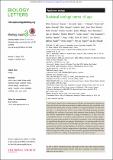Statistical ecology comes of age
Abstract
The desire to predict the consequences of global environmental change has been the driver towards more realistic models embracing the variability and uncertainties inherent in ecology. Statistical ecology has gelled over the past decade as a discipline that moves away from describing patterns towards modelling the ecological processes that generate these patterns. Following the fourth International Statistical Ecology Conference (1 –4 July 2014) in Montpellier, France, we analyse current trends in statistical ecology. Important advances in the analysis of individual movement, and in the modelling of population dynamics and species distributions, are made possible by the increasing use of hierarchical and hidden process models. Exciting research perspectives include the development of methods to interpret citizen science data and of efficient, flexible computational algorithms for model fitting. Statistical ecology has come of age: it now provides a general and mathematically rigorous framework linking ecological theory and empirical data.
Citation
Gimenez , O , Buckland , S T , Morgan , B J T , Bez , N , Bertrand , S , Choquet , R , Dray , S , Etienne , M-P , Fewster , R , Gosselin , F , Merigot , B , Monestiez , P , Morales , J M , Mortier , F , Munoz , F , Ovaskainen , O , Pavoine , S , Pradel , R , Schurr , F M , Thomas , L , Thuiller , W , Trenkel , V , de Valpine , P & Rexstad , E 2014 , ' Statistical ecology comes of age ' , Biology Letters , vol. 10 , 20140698 . https://doi.org/10.1098/rsbl.2014.0698
Publication
Biology Letters
Status
Peer reviewed
ISSN
1744-9561Type
Journal article
Collections
Items in the St Andrews Research Repository are protected by copyright, with all rights reserved, unless otherwise indicated.

